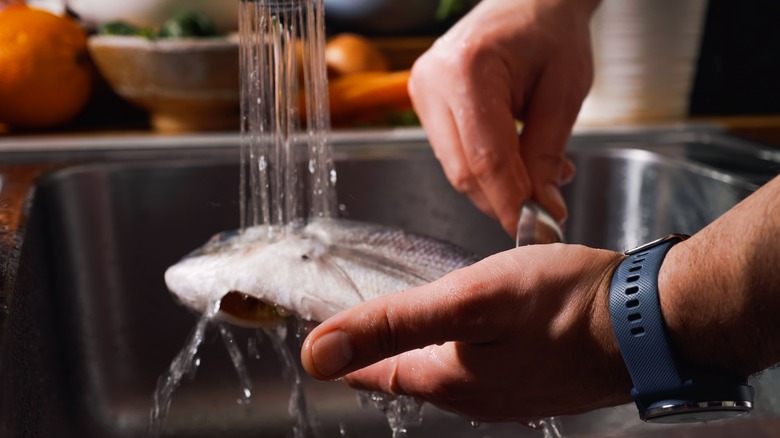Why Fish Heads Are Typically Found On The Rosh Hashanah Dinner Table
Rosh Hashanah is an important holiday within Judaism and is also known as the Jewish New Year. Since the holiday celebrates a renewal of one's relationship with god, much of the food eaten during this time takes on a symbolic meaning. Simanim is a term used by Jews for food used as a gesture of hope for the year. Some call the holiday the head of the year, so it's only appropriate that fish heads are also found around the table. Having fish (served whole) and fish heads is a tradition for many Jewish families and is tied straight to the bible, specifically the book of Deuteronomy. The practice specifically relates to the passage: "And God will make you as the head, and not as the tail, and you will be only at the top, and you will not be at the bottom."
According to tradition, it's customary to say, "May we be heads, not tails." In an interview with the Forward, Jeremy Kalmanofsky, rabbi of New York City's Conservative Congregation Ansche Chesed, explained, "Since Rosh Hashanah translates literally as 'Head of the Year,' eating a fish head on the holiday became a little joke about the verse. You should start out your year as the head [or leader] and not the tail [or follower]."
However, it's important to note that everyone celebrates Rosh Hashanah in their own way. Fish heads can be prepared in numerous ways.
Fish heads are traditionally served
To prepare a fish head traditionally, it's important not to use dairy in your recipe. Traditionally, the main course is a meaty dish, so it would be breaking kosher to have dairy in a meal that includes meat. A basic fishhead recipe involves salting and peppering the piece of fish and tossing it in the oven for 15 minutes to bake. However, you can poach them in wine or throw them on the grill as well. Some families opt to toss the fish heads in a stew instead of serving outright.
Not everyone is a fan of fish heads or serves them at a table. Some Jewish families opt to serve the entire fish with the head on as a compromise. For instance, some Italian Jewish families fix fish served in tomato sauce instead. As blogger Chani Apfelbaum told Food52, "Everyone turned their nose up at it! I love the meaning behind the custom, so instead of purchasing a fish head on its own, I prefer to serve a whole roasted fish with the tail removed. It's fresher, tastier, and a little less intimidating."
Meanwhile, some Jewish communities opt to not serve fish at all. Persian Jews traditionally eat cow tongues to celebrate the holiday. Meanwhile, some crafty vegans have swapped fish heads for heads of lettuce or cabbage to still get the symbolic meaning at the table. Of course, there are those who honor the holiday with a sheep's head instead.

